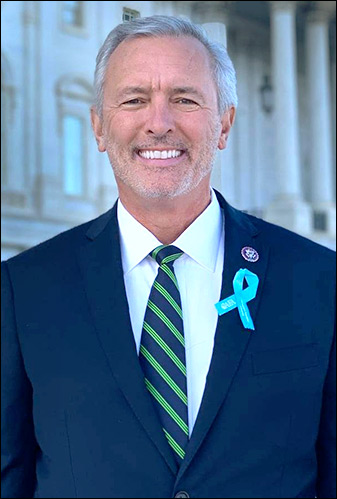Jan. 18, 2021 — New York Rep. John Katko (R-Syracuse) announced Friday that he will not seek a fifth term later this year, creating a 47th open seat for the 2022 US House elections.
Katko, who indicated that he and his wife buried all four of their parents during the past three years, which he said was “gut-wrenching,” says he now desires more time with his family. He leaves a seat where he has averaged 56.5 percent of the vote as one of only eight Republicans from the 27-member Empire State delegation.
Other factors may also have played a role in his retirement decision. Redistricting appeared to be creating some re-election problems for Rep. Katko, as had former President Donald Trump.
New York lost a seat in reapportionment — a district collapse that will come from the Upstate region. Early maps suggested that Katko’s Syracuse-anchored seat would be combined with Rep. Claudia Tenney’s 22nd District, which would result in a paired incumbent situation before the primary winner likely would face another competitive general election campaign.
In the past two election cycles, Rep. Katko’s opponent was college professor Dana Balter (D), and her challenges resulted in expensive and hard fought 53-43 percent (2020) and 52-47 percent (2018) victories. Balter spent $2.7 million and $3.3 million in her two successive races against Rep. Katko, totaling $6 million, which he countered with a combined $6.3 million. Additionally, both candidates received hundreds of thousands of dollars in support from their respective political parties and outside groups.
The NY-24 seat is one of only nine districts where the electorate supported President Biden and elected a Republican to the House. In the current Congress, the 24th is one of just three districts that Hillary Clinton carried while electing a Republican Representative. Katko had repeatedly proven himself as an effective and successful political candidate.
In a paired 2022 situation against Rep. Tenney, however, the retiring congressman would have faced increasing pressure from his political right largely because of his vote to impeach former President Trump. Additionally, the New York Conservative Party leadership said they would not allow Katko to run with their ballot line in the 2022 general election. In New York, a candidate can run with more than one party designation.
Tenney, who won the second-closest 2020 US House election, a 109-vote spread against then-incumbent Rep. Anthony Brindisi (D-Utica) that took three months to decide, was already promised Trump’s support in a race against Katko. She also would likely have seen more of her current territory in the new combined CD.
In New York, a redistricting commission provided draft maps to the legislature for its approval. The legislature is under no requirement to accept the plans, and in the current situation, so far they have not. With Rep. Katko retiring, we can predict the New York Democratic leadership will divide the 24th into multiple parts in order to give themselves an even stronger delegation split. Nationally, New York and Illinois are the most important Democratic states because they are the only two where Democrats hold the redistricting pen and can gain multiple seats.
A relatively short amount of time remains to finish the New York congressional and state legislative redistricting maps, and it is unclear when we will see the finalized district boundary plans. The candidate filing deadline is April 7 for the June 28 statewide primary.
With several more retirement announcements coming in the past few days, we now see 26 Democratic incumbents not seeking re-election; 13 Republicans similarly are not seeking re-election. There are 14 new seats created through the redistricting process with seven eliminated in reapportionment.
Rep. Katko’s retirement means that three of the 10 Republicans who voted to impeach Trump are not running for re-election. All of the remaining seven face either competitive nomination or general election challenges.

